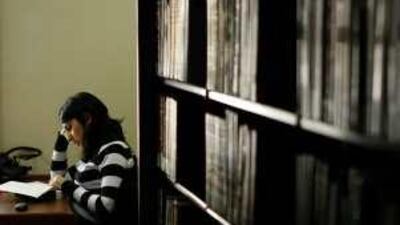IFRANE, MOROCCO // The surrounding forests are cedar, the building gables look Alpine and the language floating through the crisp winter air is English - but al Akhawayn University is in the heart of Morocco. The late King Hassan II opened al Akhawayn in 1995 in Ifrane, a remote ski town in the Atlas Mountains, to groom an elite generation of Moroccan leaders. Today, with a North American-style curriculum taught in English and a generous measure of independence, the university's 1,400-odd students are on the cutting edge of Morocco's quest to embrace globalisation and position itself as North Africa's leading entrepot. Morocco enjoys free trade with the US, and in October was granted favoured access to the European Union. But countries eager to tap the global marketplace must also give graduates the tools to thrive there.
That is where Arab countries are lagging, said Mourad Ezzine, the World Bank's section manager for education in the Middle East and North Africa. Arab governments pour money into education, but university systems remain rigid, their diplomas little valued abroad, he said. "The important thing is to allow universities to adapt and change constantly to meet the needs of the market," said Mr Ezzine. "And the market is changing fast."
Political squabbling often prevents Arab countries from facing that challenge together, said Amel Boubekeur, a researcher at the Carnegie Endowment for International Peace. Last month, a summit of Arab leaders in Kuwait City on education and development broke down amid bickering over how Arab countries should respond to Israel's assault on the Gaza Strip. Meanwhile, a generation of Arab youth is being lost, said Ms Boubekeur. "In the 1960s and 70s, students were at the forefront of political and social projects - today they're marginalised."
Al Akhawayn hopes to reverse that trend, said Driss Ouaouicha, the university's president. Students are chosen for leadership potential as well as academic prowess, and financial aid is provided to about 40 per cent who cannot pay the US$5,000 (Dh18,360) per term fees. Al Akhawayn emphasises career-making subjects such as IT and business administration, but students also take world history, comparative religion, history of ideas and other courses aimed at opening them to the world. All must do community service and are encouraged to join the university's many clubs.
"These allow us to be part of creating the university," said Samir Fannane, 21, a business administration major from Casablanca. In the building's front hall, a club fair has been driven inside by violent flurries of snow. Students gather around dozens of stalls - the Health Club, Spanish Club, Adventure Club and others. Mr Fannane is in the Hand-to-Hand Club, which helps provide school supplies and tutoring to poor villages. Last year, the club collected enough money to build one of them a new schoolhouse.
The students enjoy some of the finest facilities in the country. About 80,000 books fill the library, while in another building, students juggle imaginary stocks on computers running a simulation programme synched with the Casablanca stock exchange. Above all, students said Al Akhawayn's open intellectual climate sets it apart from other universities. "I can disagree with my professor, confident it's not going to affect my mark," said Sana Khallouk, 20, who dropped out of technical school in Casablanca to study communications at Al Akhawayn.
The key is independence, said Mr Ouaouichia, the university president. Al Akhawayn was built with royal money and answers to King Mohammed VI, though it functions largely as a private enterprise. "We're free from the ministry of education, and there's no interference in what the students do," Mr Ouaouicha said. "They come across ideas that shake their foundations - and that's a good thing at their age."
However, Morocco's most urgent need is to match university training to the job market, said Tajeddine El Houssaini, an economics professor at Mohammed V University in Rabat, the capital. Unemployment, estimated at 14 per cent, is worst among graduates, Mr El Houssaini said. Every week, hundreds gather outside the parliament building to demand public sector jobs. "Morocco should make English the principal language of technology and contact with the outside world," said Mr El Houssaini. "And universities should focus on training skilled engineers."
Arab governments are beginning to grant universities the freedom to make those kinds of changes, said Mr Ezzine, from the World Bank. "The issue is how fast - the rest of the world is not waiting." Neither are some young Arabs. Up at al Akhawayn, Samir Fannane is planning his future - a master's degree in business administration in the US, followed by several years working before returning to Morocco to start his own business. "I have no idea what kind of business," Mr Fannane said. "That will depend on the market." jthorne@thenational.ae

